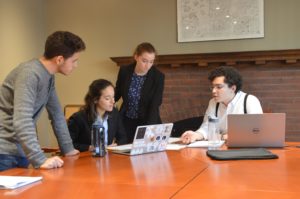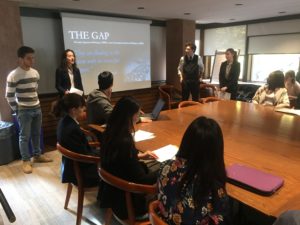STEPHANIE XU
If you were on campus during November 6th and 7th, you could almost hear the churnings of 25 brains. Tucked away at the Munk School of Global Affairs on Devonshire were Munk One students trying to solve a problem within two full days, as part of the Munk One Case Competition. While it remained calm just outside the building, intense productivity carried on inside.
The Munk One Case Competition is an annual event that occurs during the fall for current Munk One students. As a heritage gift from the former cohort to the next, the previous Munk One students prepare a recent and relevant situation in which teams of current Munk One students have 48 hours to find an intervention. By the end of it all, each group will present their solution to a panel of judges where they will be asked questions. A winning team will then be chosen based on multiple aspects.
We were lucky enough to sit down with Leonardo Pinna Cosenza, a current Munk One student, to discuss his experience throughout the whole event. As a Lester B. Pearson International scholar from Rio, Brazil, Leonardo wishes to pursue a double major in Economics and Political Science, and is interested in Latin American and development politics. This would be his first time partaking in such an activity.
When we spoke to Leonardo before the case competition, he was looking forward to the many possible solutions that may arise. Although he was very uncertain as to what the topic may be, he thought it would be interesting to witness the debates that could carry on from various students of the class (not to mention a great opportunity to really get to know his classmates). As Leonardo perceived a case competitions’ similarity to the ability in responding to an emergency that an NGO job might entail, it was nonetheless great experience for both the class’s final project and for future professional development. Leonardo concluded that he hoped to use the skills of theoretical background and research abilities developed from Munk One classes to really examine the “wicked problem”.
On the day of the actual case competition, Leonardo and his team were excited to receive the topic. As it turns out, the issue was on the resettlement of Syrian refugees in Toronto, a topic that Leonardo had somewhat expected due to its currency. The biggest challenge would be the pragmatism around the solution as there are a lot of refugees with different backgrounds. As he put it, “passion doesn’t always translate into a viable solution”.
After a few hours of group work and speaking with their student mentor, Leonardo’s group came up with two possible solutions. They decided that out of the two, the latter was more of a more viable solution as it does not have a structure imposed on the refugees. The idea was to develop a social network app/website where refugees could list their skills; it would also help foster the idea of a community by allowing people to post for in-person events. Leonardo mentioned that the group hoped to use the tools of ethnography, as previously completed in their Munk One class, to create a case study for the immigrant population. They hoped the judges would like the intervention for its sustainability, although it might not be completely accessible for everyone.
With a full day ahead to further look into their intervention, Leonardo and his group worked diligently at their idea. While they did not know what the other groups were working on, him and his team were determined to make their concept shine among possible similar ideas.
Finally, the moment of truth was upon the students. After the judges’ difficult deliberation among five amazing interventions, a winner was chosen. Despite not winning the case completion with his teammates, Leonardo still values the enriching and academically stimulating experience. He said that he invested everything he had into the project and worked intensely with his competitive team members. Walking away, Leonardo learned the importance skill of pitching ideas – to make sure that the presenter sounds approachable while displaying a clear idea, and to maintain good visuals in the presentation. He was sure to carry on these new lessons to Munk One’s final Dragon Den’s assignment in the spring.
When asked for advice for future case competition participants, Leonardo says, “attempt to put yourself into the situation that people you are impacting are. Also, try to have fun while working on the project! After all, it is during reading week and does not count towards any grades.”
Thank you Leonardo and until Munk One Case Competition 2018!

